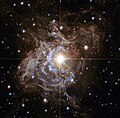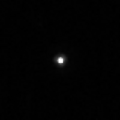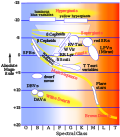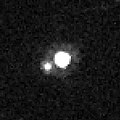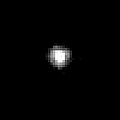astronomy, a light curve is a graph of the light intensity of a celestial object or region as a function of time, typically with the magnitude of light received...
14 KB (1,515 words) - 03:06, 27 May 2025
Supernova (redirect from Supernova light curve)
the peak of the light curve of SN1987A was provided by the decay of 56Ni to 56Co (half-life 6 days) while energy for the later light curve in particular...
201 KB (21,898 words) - 21:05, 9 June 2025
Type Ia supernova (section Light curve)
luminosity cycle of the supernova. Type Ia supernovae have a characteristic light curve, their graph of luminosity as a function of time after the explosion...
48 KB (5,061 words) - 21:31, 10 June 2025
were caused by an opaque, disk-like structure eclipsing the star. The light curve of V1400 Centauri during 2007 showed at least five major dimming events...
39 KB (3,923 words) - 16:24, 8 June 2025
SN 1987A (section Light curve)
peak of the light curve of SN1987A was provided by the decay of 56Ni to 56Co (half life of 6 days) while energy for the later light curve in particular...
49 KB (5,106 words) - 02:27, 4 June 2025
curve Galaxy rotation curve Gompertz curve Growth curve (statistics) Kruithof curve Light curve Logistic curve Paschen curve Robinson–Dadson curves Stress–strain...
7 KB (530 words) - 16:34, 2 December 2024
botany, a light curve shows the photosynthetic response of leaf tissue or algal communities to varying light intensities. The shape of the curve illustrates...
1 KB (171 words) - 21:50, 19 August 2023
Tabby's Star (section Light curve gallery)
2024[update], none of them fully explain all aspects of the resulting light curve. It has been suggested that it is an alien megastructure, but evidence...
106 KB (9,066 words) - 02:48, 30 May 2025
resulting light curve—a graph of luminosity versus time—following the explosion. Type II-L supernovae show a steady (linear) decline of the light curve following...
49 KB (4,788 words) - 15:18, 3 June 2025
Intermediate polar (section Light curve periodicities)
and circular polarization, in addition to the light curve periodicities described below. The light curve of an intermediate polar may show several types...
8 KB (997 words) - 11:24, 26 February 2023
from the distinctive light curve shapes with the rapid increase in brightness and a hump, but some with more symmetrical light curves were known as Geminids...
38 KB (4,309 words) - 20:55, 25 May 2025
Type Ib and Ic supernovae (section Light curves)
Type II-L light curve. Type Ib supernovae usually have slower decline rates for the spectral curves than Ic. Type Ia supernovae light curves are useful...
13 KB (1,509 words) - 16:28, 10 May 2025
The light curves of some events have extremely chaotic and complicated profiles with almost no discernible patterns. Although some light curves can be...
115 KB (12,616 words) - 05:02, 30 May 2025
307261 Máni (section Rotation and light curve)
light curve, where the object's true rotation period is double the single-peaked period since it spans two peaks and two troughs in its light curve.: 77 ...
59 KB (5,267 words) - 17:04, 10 June 2025
This function of brightness versus time is known as a light curve. A typical microlensing light curve is shown below: A typical microlensing event like this...
54 KB (7,176 words) - 11:54, 19 February 2025
Classical Cepheid variable (section Light curves)
Cepheids with longer periods. A Cepheid light curve is typically asymmetric with a rapid rise to maximum light followed by a slower fall to minimum (e...
40 KB (3,964 words) - 10:05, 30 May 2025
The burst had multiple peaks in its light curve and lasted approximately 80 seconds. Peculiarities in the light curve of GRB 970228 suggested that a supernova...
24 KB (2,534 words) - 11:14, 22 January 2025
152830 Dinkinesh (section Rotation and light curve)
continued observing Dinkinesh for four days to measure the asteroid's light curve. During the flyby, the Lucy spacecraft discovered that Dinkinesh has...
48 KB (3,499 words) - 07:20, 29 May 2025
solar system. This feature raised speculation about its origin. Its light curve, assuming little systematic error, presents its motion as "tumbling"...
118 KB (10,756 words) - 15:38, 1 June 2025
spectrum, it is classified as an M-type asteroid, but is not metallic. A light curve generated from photometric observations of this asteroid at Pulkovo Observatory...
4 KB (295 words) - 11:02, 2 August 2024
De Stella Nova (section Light curve)
sufficiently precise and extended over a year, allowing the supernova’s light curve to be reconstructed. "On the New Star in the Foot of the Serpent Handler"...
5 KB (518 words) - 15:47, 16 June 2024
Disrupted planet (section Tabby's Star light curve)
erratic light fluctuations in the apparent luminosity of the parent star, as may have been responsible for the oddly flickering light curves associated...
16 KB (1,509 words) - 20:00, 19 March 2025
the light from the star. If the planet transits in-between the star and the observer the change in light can be measured to construct a light curve. Light...
18 KB (2,065 words) - 20:40, 3 June 2025
the observed physical parameters of the light curve will change. The transit depth (δ) of a transiting light curve describes the decrease in the normalized...
137 KB (15,572 words) - 13:44, 9 June 2025
observations of this asteroid from multiple observatories during 2007 gave a light curve with a period of 11.8686 ± 0.0004 hours and a brightness variation of...
4 KB (248 words) - 19:58, 3 April 2024
Cosmic distance ladder (section Type Ia light curves)
particular supernovae magnitude light curves to a template light curve. This template, as opposed to being several light curves at different wavelengths (MLCS)...
56 KB (8,167 words) - 23:10, 5 June 2025
Vanth (moon) (section Light curve, rotation, and shape)
cannot resolve them individually, so the light curves from each component are combined as a single light curve.: 2 Continuous photometric observations...
34 KB (3,352 words) - 05:37, 30 April 2025
Although its shape has not been directly observed, calculations from its light curve are consistent with it being a Jacobi ellipsoid (the shape it would be...
83 KB (7,764 words) - 18:35, 7 June 2025
Varuna, one of the oldest deities mentioned in the Vedic texts. Varuna's light curve is compatible with the body being a Jacobi ellipsoid, suggesting that...
68 KB (6,703 words) - 04:17, 26 May 2025
a supernova before the maximum light, and obtain the full light curve, was small. Moreover, the existing light curves were mostly incomplete. On the other...
6 KB (732 words) - 21:43, 26 October 2024








